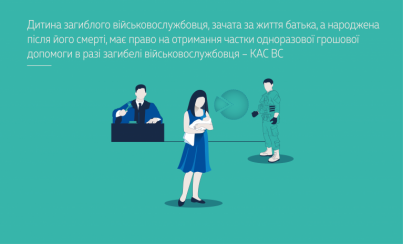Contact center of the Ukrainian Judiciary 044 207-35-46

A child of a deceased serviceman conceived during the life of the deceased and born after his death, within the meaning of Art. 16-1 of the Law of Ukraine ‘On Social and Legal Protection of Servicemen and Members of Their Families’, belongs to the circle of persons entitled to receive a one-time financial assistance in connection with the death of the serviceman (UAH 15,000,000).
This conclusion was reached by the Administrative Cassation Court of the Supreme Court.
According to the circumstances of the case, the plaintiff, on behalf of her young son, applied to the regional territorial centre for recruitment and social support for a one-off financial assistance to the son of a deceased serviceman. The defendant refused to grant the one-time financial assistance because the son of the serviceman was born after his death. Disagreeing with the defendant's decision, the plaintiff filed a lawsuit.
By the decision of the court of first instance upheld by the resolution of the appellate instance, the claim was partially satisfied. The courts were guided by the fact that the fact that the child of the deceased serviceman was born after his death cannot be a basis for concluding that this child has not acquired the right to receive a share of the lump sum in the event of the serviceman's death.
In its review of the contested decisions, the Administrative Cassation Court of the Supreme Court dismissed the cassation appeal and upheld the court decisions on the following grounds.
The Supreme Court, analysing the provisions of the special legislation of Ukraine in the field of social protection of servicemen, concluded that the families of the deceased servicemen of the Armed Forces of Ukraine are paid a one-time financial assistance in the amount of UAH 15,000,000, which is distributed equally among all recipients.
The date of entitlement to a lump-sum payment in the event of the death of a serviceman, conscript or reservist is the date of death stated in the death certificate.
Article 16-1 of the Law of Ukraine "On Social and Legal Protection of Soldiers and Members of Their Families" defines the group of persons entitled to receive a lump-sum payment in the event of the death of a serviceman: family members, parents and relatives of the deceased serviceman, conscript or reservist (as amended by Article 16-1, in force on the date of death) and parents, one of the spouses who did not remarry, children under the age of majority, dependents of the deceased (killed) (in the wording of Article 16-1, in force at the time when the claimant filed the claim and the defendant made the disputed decision).
By its very nature, the one-time financial assistance in case of death of a serviceman is compensatory in nature, it is aimed at financially supporting, as far as possible, family members (parents, children, spouse) and dependents of the deceased serviceman after their loss of a close person (provider), and therefore, the exclusion of a serviceman's child from the circle of persons entitled to receive assistance on the basis of the date of his/her birth does not comply with the content and purpose of the law.
The approach of the Ministry of Defence of Ukraine to refuse to grant a one-time financial assistance in accordance with paragraph 2 of Resolution of the Cabinet of Ministers of Ukraine of 28 February 2022 No. 168 ‘Issues of Certain Payments to Servicemen, Private and Commanding Officers, Police Officers and Their Families during Martial Law’ to a child conceived during the life of the deceased person and born after his or her death is socially unfair.
The status of an unborn child as a subject of civil legal relations is provided for in inheritance relations. This approach can also be used in legal relations related to the right of a child born after the death of a person to receive a one-off financial assistance.
The defendant's conclusion that the child of the deceased serviceman was born after his death and therefore did not acquire the right to receive a share of the one-time financial assistance in the event of the death of a serviceman is erroneous, since such an approach to the interpretation of legislation would not comply with the provisions of the Law of Ukraine ‘On Social and Legal Protection of Servicemen and Members of Their Families’, the basic principles of childhood protection, namely the equality of rights and freedoms of children, as defined by regulatory legal acts, regardless of birth or any other circumstances, as well as the international obligations of the state under Article 2 of the Convention on the Rights of the Child to respect and ensure all the rights set forth in the Convention to every child, without discrimination.
According to the panel of judges, the child of a deceased serviceman, within the meaning of Article 16-1 of the Law of Ukraine ‘On Social and Legal Protection of Servicemen and Members of Their Families’, belongs to the circle of persons entitled to receive a one-time financial assistance in connection with the death of the serviceman.
Thus, the SC Administrative Cassation Court found that the paragraph of the decision of the Ministry of Defence of Ukraine's Commission for Consideration of Issues Related to the Appointment and Payment of One-time Financial Allowance and Compensation Amounts, which denied the appointment of a one-time financial allowance to the deceased's wife acting in the interests of her minor son, was unreasonable, adopted without taking into account all the circumstances relevant to its adoption, as well as the requirements of the law, and therefore subject to recognition as unlawful and cancellation.
The Resolution of the Supreme Court of 10 May 2024 in case No. 440/6725/23 (administrative proceedings No. K/990/5495/24) - https://reyestr.court.gov.ua/Review/118962318.
This and other legal positions of the Supreme Court can be found in the Database of Legal Positions of the Supreme Court - https://lpd.court.gov.ua.